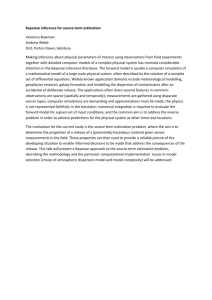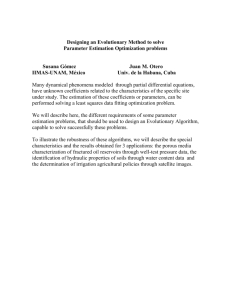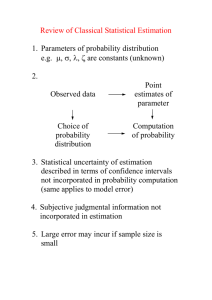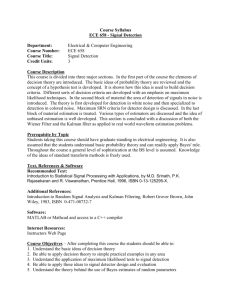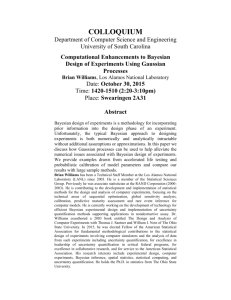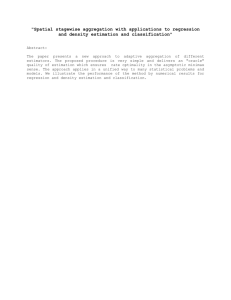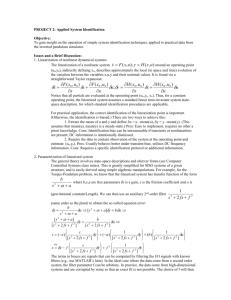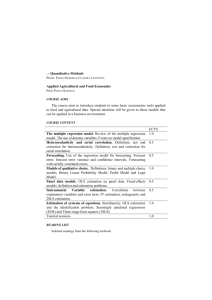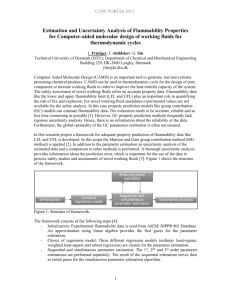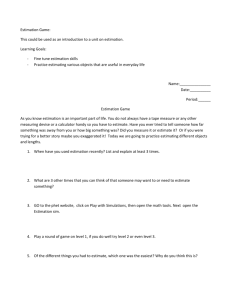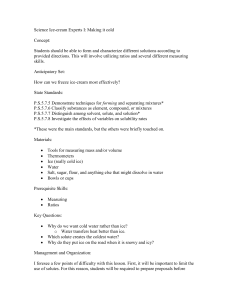MSA 8200 - Specialized Master`s Programs
advertisement
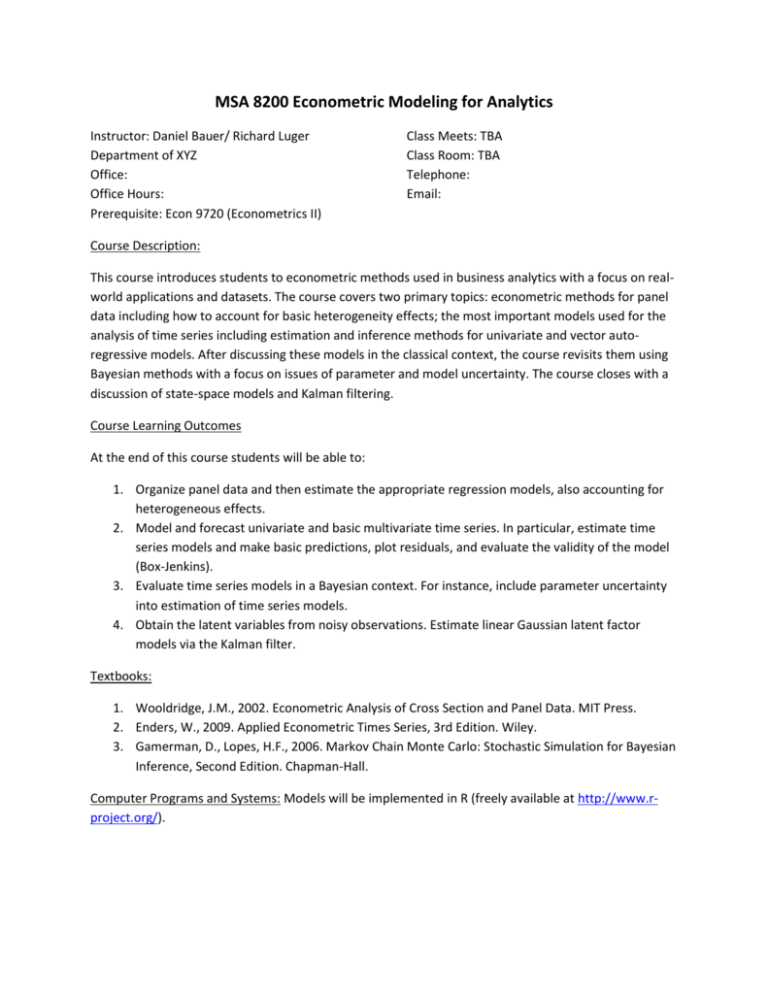
MSA 8200 Econometric Modeling for Analytics Instructor: Daniel Bauer/ Richard Luger Department of XYZ Office: Office Hours: Prerequisite: Econ 9720 (Econometrics II) Class Meets: TBA Class Room: TBA Telephone: Email: Course Description: This course introduces students to econometric methods used in business analytics with a focus on realworld applications and datasets. The course covers two primary topics: econometric methods for panel data including how to account for basic heterogeneity effects; the most important models used for the analysis of time series including estimation and inference methods for univariate and vector autoregressive models. After discussing these models in the classical context, the course revisits them using Bayesian methods with a focus on issues of parameter and model uncertainty. The course closes with a discussion of state-space models and Kalman filtering. Course Learning Outcomes At the end of this course students will be able to: 1. Organize panel data and then estimate the appropriate regression models, also accounting for heterogeneous effects. 2. Model and forecast univariate and basic multivariate time series. In particular, estimate time series models and make basic predictions, plot residuals, and evaluate the validity of the model (Box-Jenkins). 3. Evaluate time series models in a Bayesian context. For instance, include parameter uncertainty into estimation of time series models. 4. Obtain the latent variables from noisy observations. Estimate linear Gaussian latent factor models via the Kalman filter. Textbooks: 1. Wooldridge, J.M., 2002. Econometric Analysis of Cross Section and Panel Data. MIT Press. 2. Enders, W., 2009. Applied Econometric Times Series, 3rd Edition. Wiley. 3. Gamerman, D., Lopes, H.F., 2006. Markov Chain Monte Carlo: Stochastic Simulation for Bayesian Inference, Second Edition. Chapman-Hall. Computer Programs and Systems: Models will be implemented in R (freely available at http://www.rproject.org/). Requirements and Grading Policy: Attendance Policy Attendance is not formally taken. However, it is strongly suggested that students do not miss class as most students will have difficulties completing the assignments without attending the lectures. Homework There will be homework assignments to clarify and deepen concepts. You may discuss the assignments among each other, but every student has to write up the assignment on his own. Students copying from their classmates will receive a zero score. In addition, the student who let others copy from her/his assignment will receive a zero score. There are no exceptions to this rule! Grading Criteria The mid-term examination will be weighted as 50%, and the homework and the final project each as 25% of the final grade. Make-up examinations are offered only under extraordinary circumstances. Students who miss examinations should contact me immediately. Grades will be awarded on a +/- basis, and the following guaranteed scale applies. Grades may be moved upward based on difficulty, but not downward A+ 98 A 95 A90 B+ 85 B 80 B75 C+ 70 C 65 C60 D+ 55 D 50 F <50 Accommodations for students with disabilities Georgia State University complies with Section 504 of the Rehabilitation Act and the Americans with Disabilities Act. Students with disabilities who seek academic accommodations must first take appropriate documentation to the Office of Disability Services locate in Suite 230 of the New Student Center. Course Outline: This is a tentative schedule, and changes may be necessary. Week Topic Projects 1 Panel Data Methods: Introduction. Estimating systems of equations by OLS and GLS. 2 Simultaneous Equations Models (1) Interest yields indexed by time and term (FRED data). Estimation with Macro variables. Term effects and time effects. 3 Basic Linear Unobserved Effects (Fixed Effects) 4 Basic Linear Unobserved Effects (Random Effects) 5 Time Series Modeling/Forecasting: Introduction to Stochastic Processes and Time Series Time series models: Random walk, AR, ARMA, ARIMA (1) Interest yields: PCA of yields. Model factors via time series. VaR of the yield curve. 7 Identification and Estimation, Box-Jenkins procedure 8 Vector Auto-Regressive Models (2) Ice-cream Sales data: Aggregate sales indexed by time. Adjust seasonally, forecast. 9 Midterm Examination 10 Introduction to Bayesian inference: Prior vs. posterior distributions. Conjugate priors, updating. (1) Interest yields: Parameter Uncertainty in factor models. 11 Inference, relationship to parameter uncertainty & credibility (2) Ice-cream Sales data: Parameter uncertainty in aggregate sales models. 12 Introduction to the Gibbs sampler 13 Latent Variables / State Space Models: Transition vs. Measurement equation – interpretation. (1) Interest yields: Affine yield curve models. Estimation. 14 Kalman Filter, Likelihood estimation based on Kalman filter (2) Ice-cream Sales data: Factor models for ice-cream sales [temperature index, commodity index for inputs, etc.] 6 (2) Ice-cream Sales data indexed by time and location (arbitrary product). Location and time effects.
